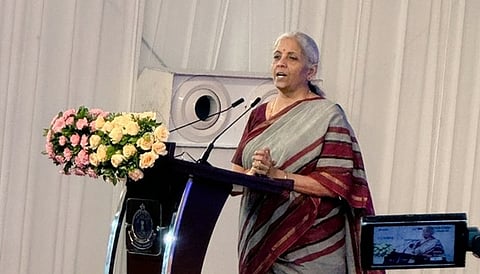
- News Updates
- PSU Watch
- Defence News
- Policy Watch
- हिन्दी न्यूज़
- Jobs Watch
- States News
- Event News

New Delhi: Finance Minister Nirmala Sitharaman on Tuesday said the GST council next month will discuss rationalisation of tax rates but a final decision on tweaking taxes and slabs will be taken later.
She also said that compensation cess on luxury and sin goods are also going to be discussed and can come up in the September 9 meeting or later.
The Group of Ministers (GoM) on rate rationalisation under Bihar Deputy Chief Minister Samrat Chaudhary met last week and broadly converged on retaining slabs under the Goods and Services Tax (GST) unchanged at 5, 12, 18 and 28 per cent.
The panel also tasked the fitment committee -- a group of tax officers -- to analyse the implication of tinkering rates on some items and present them before the GST council.
"The upcoming GST Council meeting will take up the issue of rate rationalisation. There will be a discussion on the issue. Committee of officers will make a presentation on rate rationalisation," Sitharaman told reporters here.
However, a final decision on rate rationalisation will be taken in a subsequent meeting, she added.
The 54th GST Council meeting, chaired by the Union Finance Minister and comprising state ministers, will be held on September 9.
At the 53rd GST Council meeting on Saturday, it was learnt that Karnataka had raised the issue of continuation of compensation cess levy, repayment of the loan amount and its way forward.
Officials had earlier said that the government may be able to repay the Rs 2.69 lakh crore borrowings taken in fiscal 2021 and 2022 to compensate states for GST revenue loss by November 2025, four months ahead of the scheduled March 2026.
So, how the cess amount would be apportioned beyond November 2025 could be discussed in the Council meeting, officials had said.
A compensation cess was initially brought in for 5 years to make good the revenue shortfall of states following the implementation of the GST. The compensation cess expired in June 2022, but the amount collected through the levy is being used to repay the interest and principal of the Rs 2.69 lakh crore that the Centre borrowed during COVID-19.
The GST Council will now have to take a call on the future of the current GST compensation cess with regard to its name and the modalities for its distribution among the states once the loans are repaid.
To meet the resource gap of the states due to the short release of compensation, the Centre borrowed and released Rs 1.1 lakh crore in 2020-21 and Rs 1.59 lakh crore in 2021-22 as back-to-back loans to meet a part of the shortfall in cess collection.
In June 2022, the Centre extended the levy of compensation cess, which is imposed on luxury, sin and demerit goods, till March 2026 to repay borrowings done in FY21 and FY22 to compensate states for revenue loss.
GST was introduced on July 1, 2017, and states were assured of compensation for the revenue loss till June 2022, arising on account of the GST rollout.
Though states' protected revenues were growing at 14 percent compounded growth post-GST, the cess collection did not increase in the same proportion.
COVID-19 further increased the gap between projected revenue and the actual revenue receipt, including a reduction in cess collection.
This loan is to be repaid by March 2026.
(PSU Watch– India's Business News centre that places the spotlight on PSUs, Bureaucracy, Defence and Public Policy is now on Google News. Click here to follow. Also, join PSU Watch Channel in your Telegram. You may also follow us on Twitter here and stay updated.)
